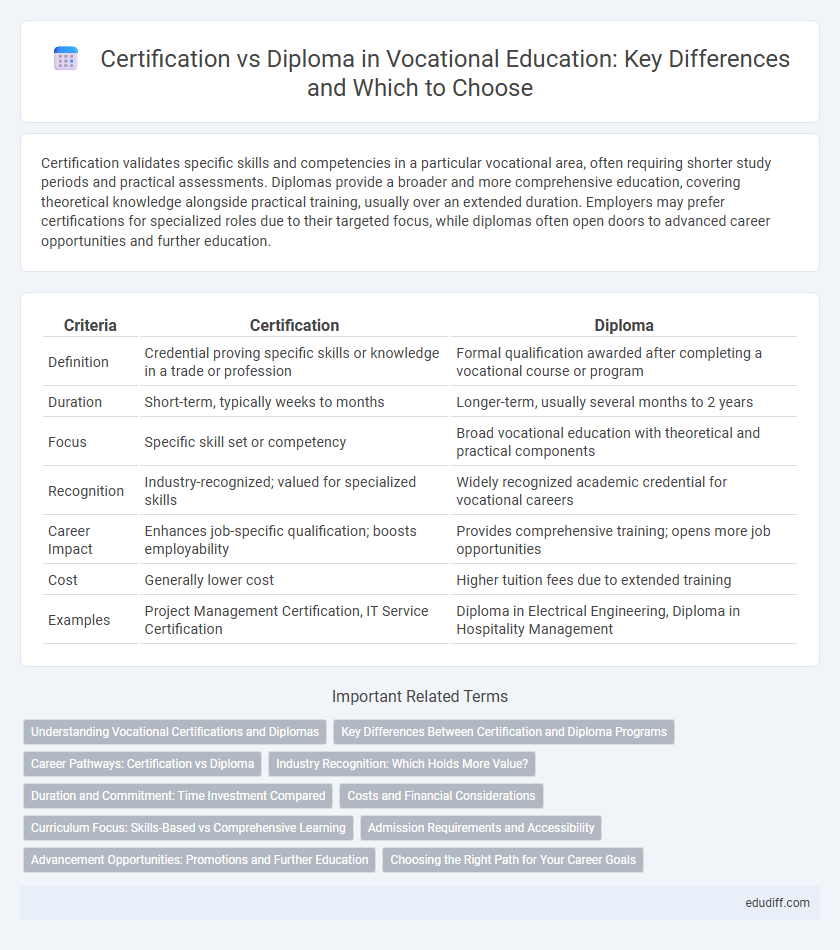Certification validates specific skills and competencies in a particular vocational area, often requiring shorter study periods and practical assessments. Diplomas provide a broader and more comprehensive education, covering theoretical knowledge alongside practical training, usually over an extended duration. Employers may prefer certifications for specialized roles due to their targeted focus, while diplomas often open doors to advanced career opportunities and further education.
Table of Comparison
| Criteria | Certification | Diploma |
|---|---|---|
| Definition | Credential proving specific skills or knowledge in a trade or profession | Formal qualification awarded after completing a vocational course or program |
| Duration | Short-term, typically weeks to months | Longer-term, usually several months to 2 years |
| Focus | Specific skill set or competency | Broad vocational education with theoretical and practical components |
| Recognition | Industry-recognized; valued for specialized skills | Widely recognized academic credential for vocational careers |
| Career Impact | Enhances job-specific qualification; boosts employability | Provides comprehensive training; opens more job opportunities |
| Cost | Generally lower cost | Higher tuition fees due to extended training |
| Examples | Project Management Certification, IT Service Certification | Diploma in Electrical Engineering, Diploma in Hospitality Management |
Understanding Vocational Certifications and Diplomas
Vocational certifications validate specific skills and competencies required in a trade or profession, often focusing on practical, hands-on expertise, while diplomas provide a broader educational foundation that includes theory alongside practical training. Certifications tend to be shorter in duration and highly specialized, offering quicker pathways to employment in targeted vocational fields such as HVAC, electrical work, or medical assisting. Diplomas, on the other hand, are typically awarded by accredited institutions and may enhance career advancement opportunities through comprehensive knowledge in areas like automotive technology or business administration.
Key Differences Between Certification and Diploma Programs
Certification programs focus on validating specific skills or competencies for immediate job readiness, often requiring less time and providing targeted expertise in a specialized area. Diploma programs offer a broader, more comprehensive education over a longer period, covering theoretical knowledge alongside practical skills to prepare students for various roles within a vocational field. Certifications typically emphasize industry-recognized standards and can be completed faster, while diplomas provide formal education credentials with a wider academic scope.
Career Pathways: Certification vs Diploma
Certification provides targeted skills and validation for specific job roles, enabling quicker entry into specialized fields such as IT, healthcare, or skilled trades. Diplomas offer broader educational foundations with comprehensive knowledge across an industry, supporting career advancement and eligibility for managerial positions. Choosing between certification and diploma depends on desired career pathway speed, depth of expertise, and long-term career goals within vocational sectors.
Industry Recognition: Which Holds More Value?
Industry recognition often favors certifications over diplomas due to their targeted skill validation and up-to-date alignment with current job market demands. Certifications typically provide specific expertise valued by employers, enhancing employability and career advancement in vocational fields. Diplomas offer broader theoretical knowledge but may lack the immediate practical applicability preferred in many industries.
Duration and Commitment: Time Investment Compared
Certification programs typically require a shorter time investment, ranging from a few weeks to several months, making them ideal for professionals seeking quick skill acquisition and immediate career advancement. Diploma programs demand a more substantial commitment, often spanning one to two years, providing comprehensive training that combines theoretical knowledge with practical application. Choosing between certification and diploma depends on the desired depth of expertise and the available time for vocational development.
Costs and Financial Considerations
Certification programs typically have lower upfront costs compared to diploma programs, making them more accessible for individuals seeking quick entry into the workforce. Diploma courses often involve higher tuition fees and additional expenses such as materials and lab access, reflecting their longer duration and comprehensive curriculum. Financial aid options like scholarships and payment plans are more commonly available for diploma programs, which can help offset these costs but require more extensive application processes.
Curriculum Focus: Skills-Based vs Comprehensive Learning
Certification programs emphasize skills-based learning, targeting specific competencies required for particular trades or professions. Diplomas provide comprehensive learning, covering both theoretical knowledge and practical skills across broader subject areas. This distinction caters to different vocational goals, with certifications enabling quick upskilling and diplomas supporting in-depth career development.
Admission Requirements and Accessibility
Certification programs typically require minimal admission criteria, such as a high school diploma or relevant work experience, making them highly accessible for individuals seeking quick entry into vocational fields. Diplomas often demand more comprehensive prerequisites, including specific academic qualifications and longer course durations, reflecting their in-depth curriculum structure. This distinction in admission requirements affects accessibility, with certifications offering more flexible and faster pathways compared to the more structured and rigorous diploma programs in vocational education.
Advancement Opportunities: Promotions and Further Education
Certification programs offer targeted skills recognition that often leads to faster promotion opportunities within specific vocational fields, while diplomas provide comprehensive education that supports broader career advancement and eligibility for higher education degrees. Employers frequently prioritize certifications for specialized roles requiring immediate expertise, whereas diplomas serve as a foundation for managerial positions and academic progression. Combining certification with a diploma can maximize advancement potential by blending practical skills with theoretical knowledge.
Choosing the Right Path for Your Career Goals
Certification programs offer focused skill validation and faster entry into specific trades, ideal for those seeking immediate job readiness in vocational fields. Diplomas provide comprehensive training and broader theoretical knowledge, aligning with careers requiring deeper expertise and potential for advancement. Evaluating your career goals, industry demands, and time commitment helps determine whether certification or a diploma best supports your vocational aspirations.
Certification vs Diploma Infographic

 edudiff.com
edudiff.com